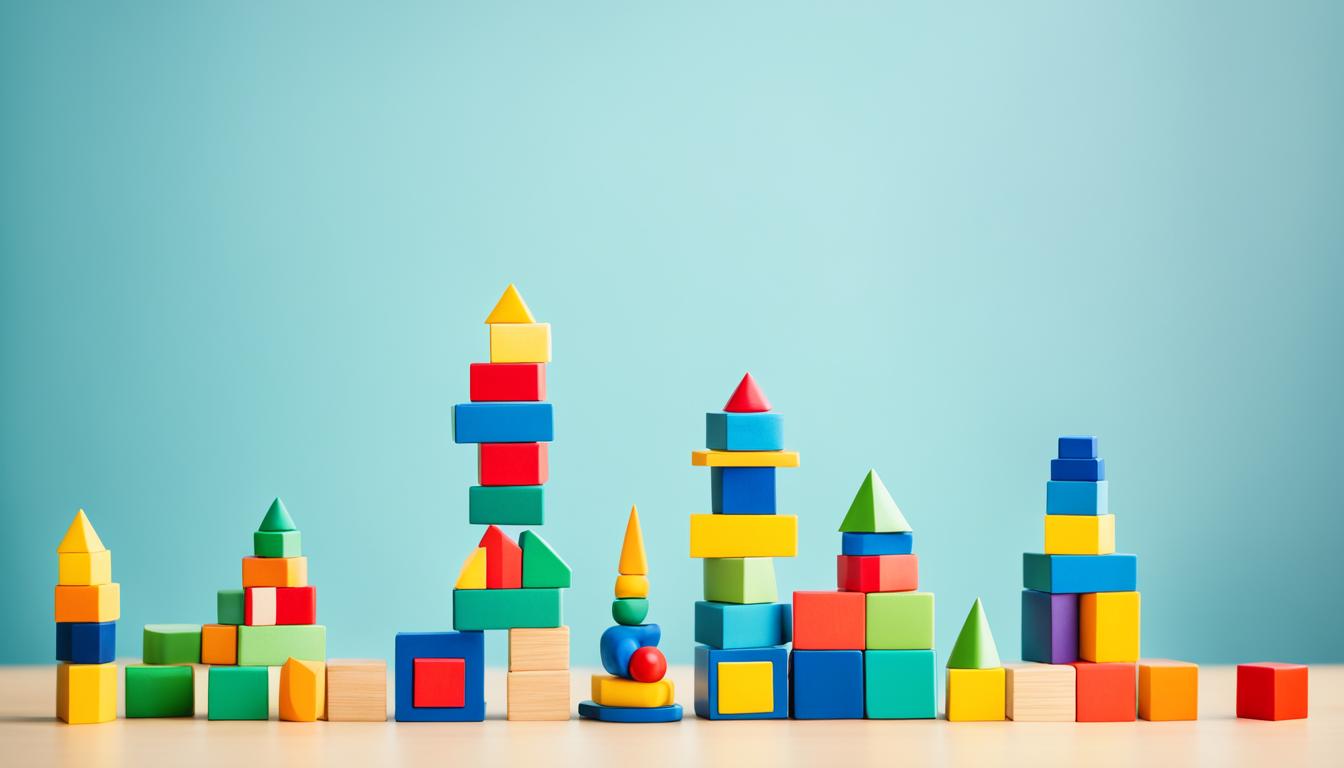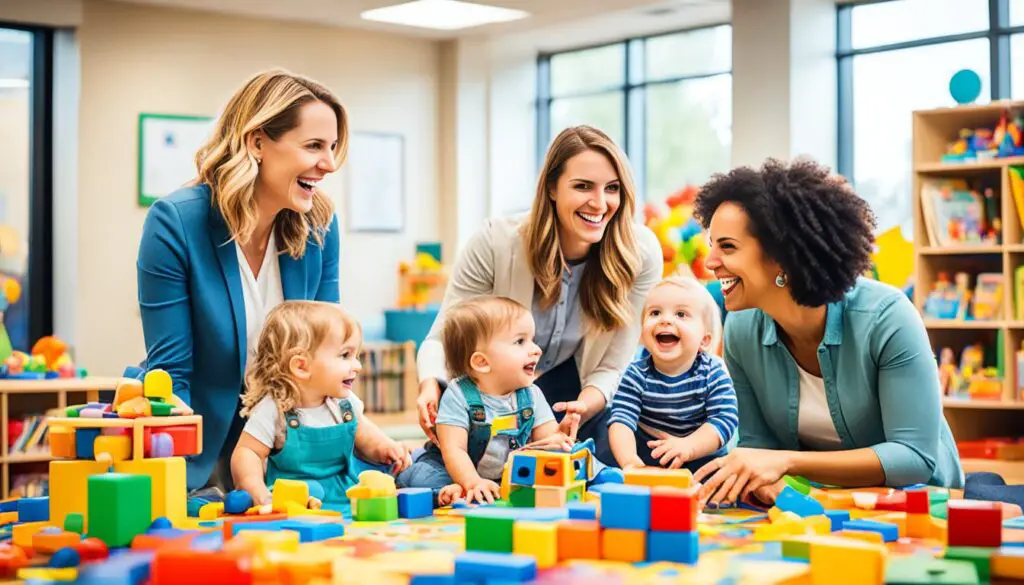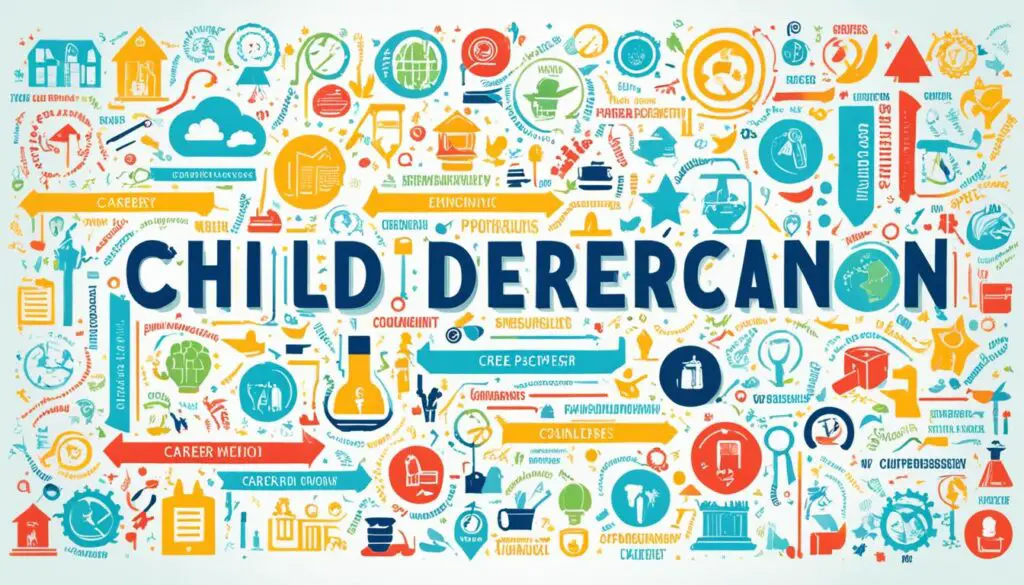
A Comprehensive Look at Bachelor’s Degrees in Child Development
Welcome to our comprehensive guide on Bachelor’s degrees in child development. In this article, I will provide you with valuable insights into the world of child development programs and the exciting career options that await graduates in this field.
A Bachelor’s degree in child development equips students with the knowledge and skills necessary to understand and promote the healthy development of children. This interdisciplinary program delves deep into various aspects of child development, including physical, cognitive, emotional, and social growth.
Throughout the program, students learn about the latest theories and research related to child development, gaining a solid foundation to make a positive impact on the lives of children and families. Additionally, they develop practical strategies for promoting healthy development in a variety of contexts, from educational settings to social work.
By pursuing a Bachelor’s degree in child development, you open up a world of career opportunities. Graduates can explore careers in education, child care, social work, research, and more. Whether you aspire to become a teacher, child development specialist, or child advocate, a degree in child development can pave the way for a fulfilling and rewarding career.
Key Takeaways:
- Bachelor’s degrees in child development provide a comprehensive understanding of the healthy development of children.
- Students gain theoretical knowledge and practical skills to promote child development across various contexts.
- Career options in child development include education, child care, social work, research, and more.
- Graduates can make a positive impact on the lives of children and families through their work.
- There is a growing demand for professionals with expertise in child development.
The Benefits and Curriculum of Bachelor’s Degrees in Child Development
Bachelor’s degree programs in child development offer a comprehensive curriculum that covers various aspects of child development, including physical, cognitive, emotional, and social development. Students in these programs learn about theories and research related to child development, as well as practical strategies for promoting healthy development in children.
The curriculum often includes courses in:
- Child psychology
- Early childhood education
- Family dynamics
- Developmental assessments
Through these courses, students gain a deep understanding of child development theories and learn how to apply them in real-world situations. They acquire the knowledge and skills necessary to support the growth and well-being of children.
One of the highlights of bachelor’s degree programs in child development is the opportunity for students to engage in internships or practicum placements. These experiential learning opportunities allow students to gain hands-on experience in childcare centers, schools, or other relevant settings. By working directly with children and families, students can apply their theoretical knowledge and develop practical skills.
Internships provide valuable insights into the day-to-day challenges and rewards of working in the field of child development. Students can observe child development professionals in action, collaborate with experienced practitioners, and contribute to the care and education of children. These experiences enhance students’ understanding of child development and help them build important skills for their future careers.

Internships offer students a chance to apply their knowledge and acquire hands-on experience in the field of child development. They provide real-world insights and allow students to develop the skills needed for their future careers.
Career Options and Job Outlook for Graduates with a Bachelor’s Degree in Child Development
Graduates with a Bachelor’s degree in child development have diverse and rewarding career options to explore. These graduates can make a positive impact in the lives of children and families through various roles in education, social work, research, and policy development.
Educational Settings
In educational settings, such as preschools, elementary schools, or early intervention programs, graduates with a child development degree can pursue career paths as:
- Teachers – Educating and guiding young learners towards their developmental milestones.
- Child Development Specialists – Assessing and supporting children’s individual needs in their educational journey.
- Curriculum Coordinators – Designing and implementing developmentally appropriate curriculum and programs.
Social Work
Career opportunities in social work provide graduates with the chance to work directly with children and families, making a significant difference in their lives. Some roles include:
- Child Protection Worker – Advocating for the safety and well-being of vulnerable children.
- Family Support Specialist – Providing guidance and resources to families in need.
- Child Advocacy Coordinator – Promoting policies that protect and support children’s rights.
Research and Policy Work
For those passionate about shaping policies and contributing to evidence-based practices in child development, careers in research and policy work offer exciting opportunities. Graduates can pursue roles such as:
- Research Assistant – Conducting studies and contributing to the understanding of child development.
- Policy Analyst – Analyzing policy frameworks and advocating for effective strategies.
- Program Evaluator – Assessing the impact of child development programs and recommending improvements.
With the growing recognition of the importance of early childhood development, the job outlook for child development graduates is promising. The demand for qualified professionals in the field is expected to continue to grow, providing graduates with a range of opportunities to make a meaningful difference in the lives of children and families.
| Career Option | Median Salary | Job Growth (2019-2029) |
|---|---|---|
| Early Childhood Educator | $30,520 per year | 4% (As fast as average) |
| Social Worker | $51,760 per year | 13% (Much faster than average) |
| Research Assistant | $47,510 per year | 5% (Faster than average) |
| Policy Analyst | $58,760 per year | 6% (Faster than average) |

Conclusion
Obtaining a Bachelor’s degree in child development is vital for those seeking a fulfilling career in promoting the well-being and healthy development of children. This degree equips graduates with a solid foundation in theories and research related to child development, enabling them to make a positive impact on the lives of children and families.
The future prospects in the field of child development are promising. There is an increasing demand for skilled professionals who can contribute to the education, care, and support of children. As society recognizes the significance of early childhood development, the need for qualified individuals in this field continues to grow. Graduates with a Bachelor’s degree in child development can look forward to diverse career opportunities and the satisfaction of knowing that they are making a difference in the lives of children and families.
By pursuing a child development degree, individuals can position themselves for a rewarding career that aligns with their passion for supporting children’s growth and well-being. Through their knowledge and expertise, these professionals play a crucial role in shaping the future of our society, one child at a time.
FAQ
What is a Bachelor’s degree in child development?
A Bachelor’s degree in child development is a comprehensive program that equips students with the knowledge and skills necessary to understand and promote the healthy development of children.
What does the curriculum of a child development degree program include?
The curriculum of a child development degree program often includes courses in child psychology, early childhood education, family dynamics, and developmental assessments.
Are there practical experiences involved in a child development degree program?
Yes, students in child development degree programs often have the opportunity to gain hands-on experience through internships or practicum placements in childcare centers, schools, or other relevant settings.
What career options are available for graduates with a Bachelor’s degree in child development?
Graduates with a Bachelor’s degree in child development can pursue careers in education, social work, research, and policy work, amongst others.
What job opportunities are there in the field of child development?
The job market for child development professionals is promising, with a growing demand for individuals who can contribute to the education, care, and support of children.
How can a Bachelor’s degree in child development make a difference in the lives of children and families?
With a strong foundation in theories and research related to child development, graduates are equipped with the knowledge and skills to promote the well-being and healthy development of children and make a positive impact in their lives.